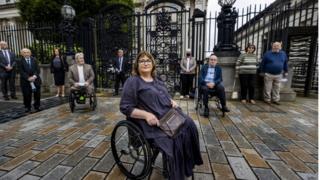Troubles pensions delay unlawful, rules High Court
 Image copyright
Liam McBurney/PA
Image copyright
Liam McBurney/PA
The NI Executive Office is acting unlawfully in delaying the introduction of a compensation scheme for injured Troubles victims, a judge has ruled.
Mr Justice McAlinden was ruling on a legal challenge to the delay brought to the High Court in Belfast.
The victims' payments were approved by Westminster in January.
They would give regular payments to people seriously injured, but have been long delayed by arguments over the definition of a Troubles victim.
The judge said the Executive Office was deliberately stymieing the commencement of payouts in order to pressurise the government into funding it and, in Deputy First Minister Michelle O'Neill's case, getting the eligibility criteria changed.
Ms O'Neill had declined to progress the scheme by refusing to allow the Executive Office - which she runs jointly with DUP First Minister Arlene Foster - to nominate a department to administer the pension payments.
Sinn Féin has said that the criteria for those who are eligible to apply potentially discriminates against some republicans with convictions from the Troubles.
Following Friday's court ruling, Ms O'Neill said: "As joint head of government I remain committed to delivering a scheme, which is based on equality and open to everyone who was seriously physically and psychologically injured during the conflict.
"In light of the court ruling, therefore, I am left with no alternative other than to designate a department.
"However, that designation will require the Executive to work together to secure the additional funds from Westminster for the cost of the scheme and get further clarity on eligibility and applications."
The ruling came after legal challenges by two victims to the continued impasse around introducing the scheme with an estimated cost of £100m.
Jennifier McNern lost both legs in an IRA bomb attack on the Abercorn Restaurant in Belfast city centre in March 1972.
Proceedings were also brought by Brian Turley, one of the so-called Hooded Men detained and subjected to special interrogation methods by the British military in the early 1970s.
Even though legislation was passed for the pension scheme which should have opened for applications in May, it remains in limbo due to a dispute over eligibility for payments.
Under new guidance anyone convicted of causing serious harm during the Troubles would be ruled out.
Sinn Féin claims the British government policy is discriminatory.
'Shocking proposition'
In his determination, Judge McAlinden said: "What is in reality being done is that the Executive Office is deliberately stymieing the implementation of the scheme in order to pressure the secretary of state to make a different scheme which will be substantially directly funded by Westminster ad which will have very different entitlement rules."
He added: "This is a truly shocking proposition.
"It demonstrates either wilful disregard for the rule of law, or abject ignorance of what the rule of law means in a democratic society."
The judge expressed hope that the finding of illegality will set in motion a chain of events towards grant funding being provided.
Speaking afterwards, Ms McNern said: "I should never have had to take this case.
"None of us were in the wrong place at the wrong time. We were at home with our families. We were at work. We were in a cafe having a coffee. We were coming home after a day out or an evening at the cinema.
"There were people in the wrong place and they catastrophically changed our lives for ever."